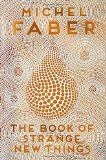Five words from the blurb: missionary, leaving, wife, adventure, worlds
The Book of Strange New Things is an impressive book. It is nearly 600 pages long, but the intensity of the emotion means that it never drags and so seems much shorter.
The book centres on Peter, a missionary who travels to another planet to teach Christianity to a strange new species. He leaves his wife Bea on Earth and the pair communicate via an electronic system. Bea struggles on her own, especially as things on Earth begin to go wrong. The book shows how their strong relationship begins to falter as Peter finds himself increasingly absorbed by his work.
Not much actually happens in this book, but I was completely absorbed by the couple. Having had a long distance relationship I found their shifting emotions scarily accurate.
He sighed, squeezed her hand. What was he going to do without her, out in the field? How would he cope, not being able to discuss his perceptions? She was the one who stopped him coming out with claptrap, curbed his tendency to construct grand theories that encompassed everything. She brought him down to earth. Having her by his side on this mission would have been worth a million dollars.
The world-building was fantastic. The vivid descriptions enabled me to visualise the new planet and I found the quirky differences between our world and theirs entirely believable. The alien species were particularly well observed and I loved the way the human’s interactions with them highlighted the problems within our society.
My only issue with the book was the occasional excess of religious quotation. I thought the discussions on faith were well done, but my eyes tended to glaze over when the bible extracts became excessive. Luckily this only happened a handful of times and I suspect that anyone with an interest in Christianity will find these much more inspiring than I did.
Overall this was a fantastic book. I loved the fact I didn’t know where the story would take me and found the ambiguous ending particularly satisfying. Recommended to those who enjoy vivid character studies, packed with emotion.

.
The thoughts of other bloggers:
The real problem, it dawns on you as you read, is that Faber just isn’t that interested in his alien Others. Sibilant Frictive
…one of the best novels I’ve read this year. S Krishna’s Books
In fact, The Book of Strange New Things is a novel that skirts the edge of one cliché after another only to either bypass them or—more impressively—reinvest them with emotional significance. Reading in the Growlery


9 replies on “The Book of Strange New Things by Michel Faber”
This book has been on my radar and I’m glad you enjoyed it so much. Indeed I was put off by the size a bit so it’s good to see that it’s engaging. I love good world building!
Judith, It did take me a while to read, but I loved it throughout so was actually glad it was so long. I hope you enjoy it too!
Glad to hear you liked this–I thought it was just a beautiful book. Thanks for linking to my review!
Tamsin, Yes, such great writing. I’m sad I’ve finished it.
Oh huh. This isn’t at all what I thought this book was about. It sounds more interesting than I originally thought — I love it when sci-fi books get mainstream attention!
Jenny, I think a lot of people are being disappointed as they go into it thinking one thing (aliens or religion) and it is actually a slow story about a couple and their long distance relationship. The sci-fi elements are quite minimal, but they do add to the overall effect. I hope you enjoy it as much as I did.
[…] The Book of Strange New Things by Michel Faber […]
Agh, Jackie… we usually seem to agree on books but I’m 200 pages in and seriously considering giving up on it. I’m assuming the book goes somewhere interesting ideas-wise eventually, because so far only the fact that it is very easy to read is keeping me going. I’m finding the writing is workmanlike at best and sometimes clunky, the USIC characters paper-thin (largely distinguished by whether they say “Howdy” or “Yo, Bro”) and the dialogue demonstrates a real tin ear (and don’t even get me started on Bea’s letters to Peter where she repeatedly tells him things he would already know and uses phrases like “the local baker” which makes it sound like they live in different towns not the same house). And I know it’s in the title of the book, but if Peter describes anything else as “strange new…” I’ll scream: I keep hearing William Shatner every time he does it!
David, Oh no! Sorry to hear that you aren’t enjoying it. It sounds as though you should give up as the problems you mention will persist through the book. The USIC characters are all vague, but I think that is the point. It doesn’t matter that the reader can’t tell them apart as they all serve an identical purpose. Bea and Peter are the only characters that really matter and everyone else is a shadow in comparison.
I actually found Bea’s letters realsitic. They are how normal people write. She is confused and upset so will repeat things. I also refer to my butcher as “the local butcher” as the name of it changes so frequently it is easier that way!
I think it contains many interesting concepts, but I loved it from the very start so maybe this one isn’t for you 🙁